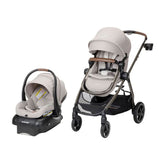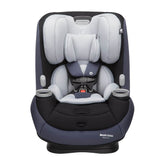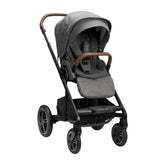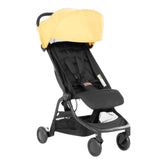When Do Babies Start Laughing? How to Make Them Giggle

Updated 26 Dec 2024
From hearty belly laughs or happy little giggles, when babies start smiling and laughing, there’s truly no sweeter sound in the world. Babies practice making noises from the moment they're born. All the coos, grunts, and squeaks they’ve been making up to this point are a sort of “training” for that first outburst of chuckling, an important part of learning how to express themselves and a sign of healthy development. That first moment when babies start laughing out loud is one of the most exciting a parent will experience. If you’re anxiously awaiting the day you’ll hear those first giggles, you’re not alone. Let’s take a closer look at when babies start to laugh.

When Do Babies Start Laughing and Smiling?
According to the American Speech-Language-Hearing Association, the average age range for a baby’s first giggle or laugh is between four and six months old. Individual babies are different, though, and some may have their first chuckle a little before or after that. That first laugh may be triggered by seeing a person, a pet, or a toy that your baby loves. Once your little one has discovered how to laugh, they may laugh "just because." Laughter feels good to all ages, and it's such an entertaining new sound to make!
As with any newly learned talent, laughing may take a little time and practice. With each little giggle and coo, they’re learning how to move their mouth and tongue to produce different sound effects. Your little one will most certainly laugh more as they grow older. It’s a sound that not only delights caregivers, but babies love seeing a reaction to it as well.
Babies develop and change quickly during their first year of life. The important developmental stages they pass through are known as milestones. Laughing is an exciting milestone. Though the precise age each child will hit a particular milestone will differ, milestones can serve as a general guideline for what to expect and when. This can help reassure parents that their baby's development is on track. Many milestones precede and build upon one other (like scooting > crawling > cruising > walking). If your infant has learned to smile, you can probably expect to start hearing giggles very soon.

How to Make Your Baby Laugh and Smile
Don’t worry – you don’t have to be a professional entertainer to coax those first giggles out of your baby. Often, just seeing their caregiver smile will inspire that first burst of laughter. Every little one is unique and has their own sense of humor. The most successful attempts at trying to make your baby laugh will probably happen when they’re full, alert, and well-rested (i.e., don’t try your comedy routine when they’re hungry or tired). Just try to play with and enjoy your baby, and the giggles will follow. Here are a few ways you can try to encourage laughter.
Kiss their nose
Your baby is probably expecting you to lean in for a regular kiss, but surprising them by switching it up with a playful nose rub or kiss might elicit a few giggles.
Play peek-a-boo
Peek-a-boo helps to develop your baby’s memory and teaches them about object permanence. Object permanence is the ability to understand that an object still exists even when it can’t be seen. When an infant plays peek-a-boo, they’re typically quite surprised to see it re-appear after being gone. For babies, it’s like magic. Scientists have even suggested that peekaboo triggers laughter because it is the very first “joke” that a child enjoys. The initial anxiety caused by the caregiver’s disappearance is resolved by their reappearance.
Sing
You don’t need great pipes to sing to your baby. They already adore the sound of your voice. Songs with accompanying hand motions, like “The Itsy Bitsy Spider,” are especially popular with babies.
Make silly faces
By four months, your little one has become familiar with your facial expressions and tries to imitate them. Sticking out your tongue, bugging your eyes, or scrunching up your nose may offer an unexpected surprise that elicits a chuckle.
Blowing raspberries
Blowing raspberries on your baby’s little tummy is a terrific way to get a laugh. Simply kiss your baby’s tummy while blowing out. The sensation and the sound are both great for giggles.
Avoid tickling to make your baby laugh
Tickling may seem like a natural way to get your baby to laugh, but it’s better to wait until they’re a little older and have had a chance to better develop their laughter skills. Just like grown-ups, some babies find tickling enjoyable, whereas others find it uncomfortable or painful. Once they can better express their feelings and communicate more clearly, you can try tickling.
Missing the Milestones: Is Baby Laughing a Milestone?
Why Isn't My Baby Laughing and Smiling?
Every baby is unique and hits their milestones at different times. Milestones are simply an estimated normal range of when a baby might hit important developmental achievements. However, if your little one appears to have missed the laughing milestone, it’s worth investigating. Mention this to your pediatrician if your baby hasn’t laughed by six months of age. It may signal a developmental delay that could be helped with early intervention. Other missed milestone red flags you’ll want to be on the lookout for during your baby’s first year include
- inability to make eye contact
- lack of cooing or babbling
- absence of social smiling
- shakiness or uncontrolled movements
- inability to wave or gesture
- lack of muscle control
- loss of skills they once had
The Takeaway on When Babies Start Laughing
As the old saying goes, “comparison is the thief of joy.” Try not to get caught up on social media or in real-life friend groups by comparing who’s baby is further ahead developmentally. As long as your little one is healthy and doesn’t show any warning signs in terms of their development, try to just enjoy the stage they’re in and their own individual timetable. The laughter will come eventually. If you’re concerned, reach out to your healthcare provider for guidance and advice.










